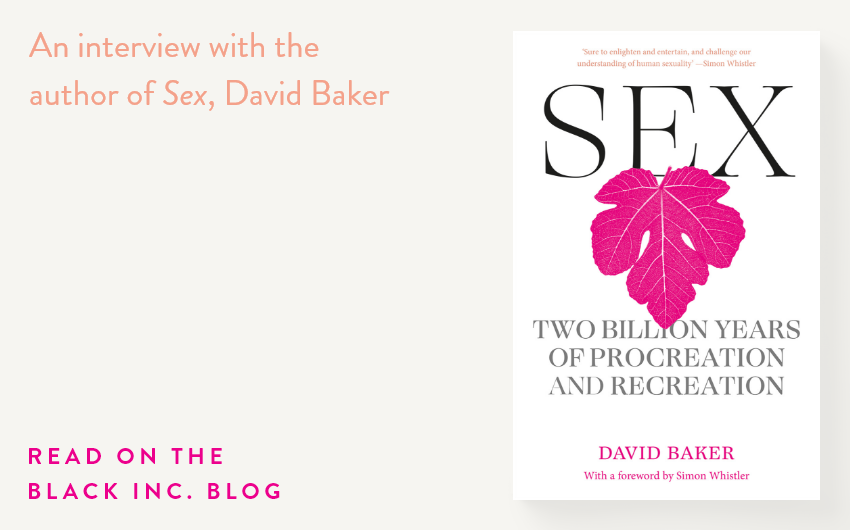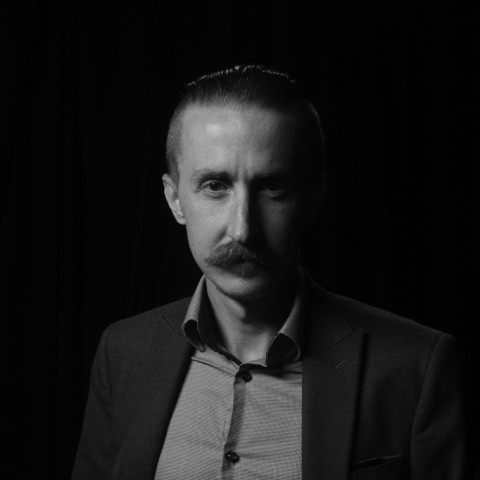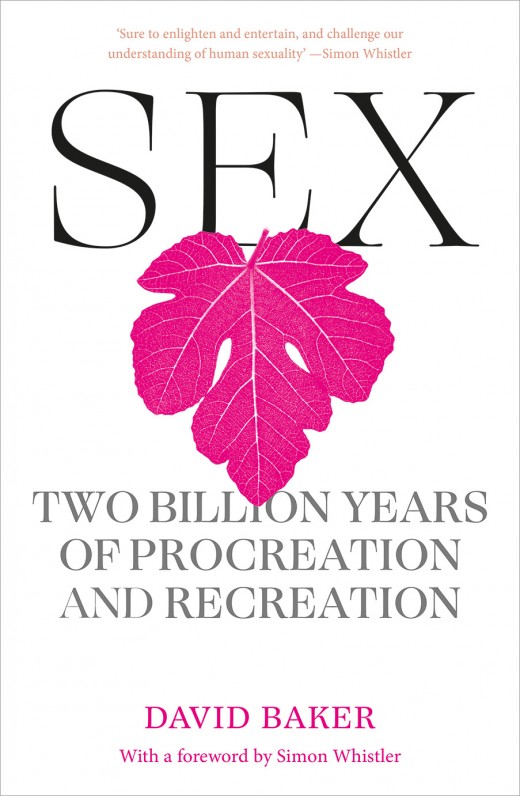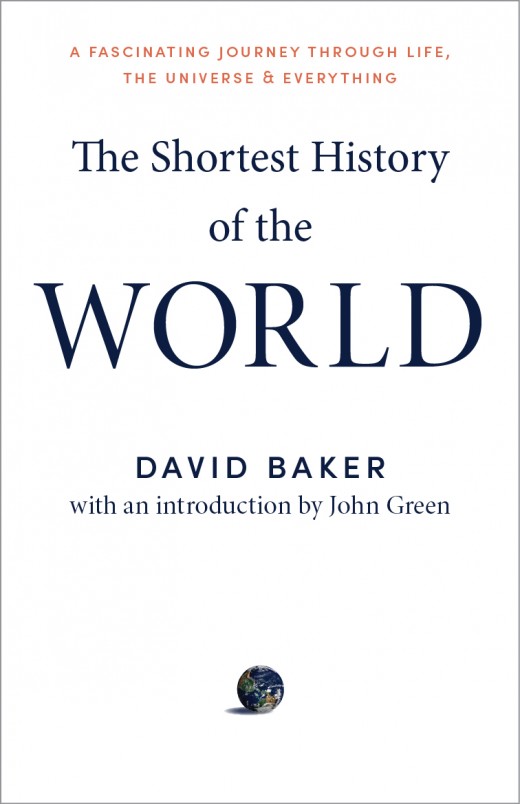News

News >
An interview with the author of Sex, David Baker
David Baker is a history and science writer who holds the world’s first PhD in Big History. He wrote the YouTube series Crash Course Big History, hosted by John and Hank Green in partnership with the Gates Big History Project, and The Shortest History of the World. His latest book is Sex: Two Billion Years of Procreation and Recreation.
In this interview, David talks Big History, shocking revelations in his research about sex, and what this book means for the present and future of sex and relationships.
You’re one of the world’s few trained specialists in Big History. Can you tell us what that means?
It means I spent a decade of training and a long research career steeped in both the natural and social sciences, that normal disciplinary divisions and academic ‘silos’ mean nothing to me, and I can pursue connections and explore patterns across them all. Whatever subject or question interests me, I look into it without worrying about what silo it fits into, so long as the results of the investigation can be woven into a clearer picture of the overall whole.
The more you research, the more you learn about the world, the easier it becomes to craft an overarching narrative, and to identify patterns connecting seemingly disparate source material. You begin to realise that perhaps these overarching questions should not wait decades until the end of a career, that thousands of pages may occlude the broader patterns of a wide-ranging narrative, and that the amount of detail a narrative requires depends upon the nature of the question you ask at the outset. Not to mention that this approach can reveal questions that we’ve never even thought of before.
How did you come to write a book about sex?
Within my field, master narratives of the entire Universe had been done, along with ‘little big histories’ that chart the course of specific objects or systems or ideas over 13.8 billion years. There's even a ‘little big history’ of grass. But nobody in my field had done it for sex before. I took a look at the wider scholarship on the history of sex, and nobody had done it on the scale of Big History. Most histories of sex cover the past few hundred years, with emphasis on the 19th century and the mid-20th-century Sexual Revolution, with some others taking a broader view back to antiquity. There are still others that make much play of humanity’s shared heritage with the other great apes and delve deeply into primatology and evolutionary psychology. Very few histories combine the two. Furthermore, no history, as far as I had seen, takes the further step to combine those two elements to the even deeper evolutionary heritage of sex going back to the very beginning of the phenomenon in the first place.
Finally, on a personal note, I suppose it’s because being human, and there being numerous aspects of sex that I had never sat down and contemplated, there would be a great deal for me to learn over the course of writing the book. And, spoilers, I certainly did.
How does one go about writing such a wide-ranging book as Sex or your last book, The Shortest History of the World? Where did you start?
Like with any big history, you start at the beginning. Even before the emergence of sex, if only to understand the contrast of the world before it and the world after it appeared. That reveals some of the basic characteristics that make sex distinct and strange and wonderful. And then you take it from there. Charting a course down our lineage, with a mind of pinpointing the aspects of human sex today, and figuring out when they appeared and why. Some of these aspects appear very early, others are relatively recent.
Without spoiling too much – what’s one of the most shocking things you discovered in writing this book?
How brutal, messy, and horrific sex can be. Along with how haphazardly the whole thing was cobbled together. This not only goes for sex in natural history – because of course the Darwinian world can be a brutal one – but also applies to no small extent to human history in the Paleolithic, Agrarian, and Modern eras. What is perhaps the great miracle of sex is that we are able to derive even a moment's pleasure from it, given its many turpitudes and miasms, to speak nothing of those happy few who are able to forge lifelong, loving relationships.
Were there any aspects of human culture you were surprised to find linked back to sex?
Probably the extent to which sadomasochism is widespread in modern human society and how it links back to the instinctual social hierarchies that were set up by our last common ancestors with other primates, which then subsequently evolved in human foraging, Agrarian, and Modern societies into immensely complex systems. The link between humanity’s deeply ingrained sexual fetishes and seemingly non-sexual aspects of culture and social organisation are rarely discussed or reflected upon, and I can entirely understand why. It is unseemly and entirely embarrassing. And yet it lurks beneath the skin of even the most unlikely individuals.
What do you think are the biggest challenges people face in their sex and romantic lives today?
Dealing with a perceived glut of opportunities and possibilities, navigating them and finding something that ultimately will make an individual happy (and it will vary). We live in a world where a shocking number of people are retreating from relationships, are even retreating from sex, and where record numbers of people are winding up dissatisfied and alone. Which seems odd given we live in a world of increased sexual freedoms and evaporating social stigmas. If anything, the explosion of change we’ve experienced in the last century has left many of us confused, and it is very difficult for an individual to chart a course through modernity with any degree of certainty.
How might this book prove useful to the people who read it?
The general Ciceronian principle I apply to history is that ‘to not know what happened before you were born is to forever remain a child’. I can’t say that the book represents a cure for contemporary confusion, and it certainly doesn’t prescribe any single strategy or way of life, but it seems to me that given how central sex is to all our lives, one might gain some peace of mind knowing where certain physical and instinctual aspects come from, and how they have interplayed with continually changing cultures over the millennia. The world of sex and romance is confusing enough without being puzzled about why things are the way they are in the first place. If you know where the maze of factors concerning your sex life come from, you might just be able to keep things in perspective while you pursue a happy situation of your own – whatever that might be.
How has writing Sex changed the way you think today?
It has made me more anxious for the younger generation. I think the modern revolution of the past 200 years, the sexual revolution of the past 60 years, and the continual rapid pace of technological and cultural evolution has put them in a fairly sticky situation. I see a lot of negative trends today that may only get worse in the near future. And they could actually negatively impact the growth of modern civilisation as a whole. It might be a teething situation, where society will approach a greater equilibrium and be able to cope with pressures on our sex lives a few generations from now.
Even so, this is cold comfort for the Millennials and Zoomers who will likely go through their entire lives well before such an equilibrium is reached. For them, if I may contradict the statement above about ‘no prescriptions’ (and only because this answer is not going in the book), I would say they need to get off the dating apps, start either approaching or being open to being approached in public again, and let personal chemistry take hold. The statistics of success are overwhelmingly in favour of such a strategy. We’ve become too isolated by dint of technology, especially since the pandemic. For similar reasons, I would advise throwing out the lists of ‘expectations’ that have grown extraordinarily long for most people, and focus again on personal chemistry. There’s this extraordinarily destructive notion we have that we already know the ‘ideal partner’ ahead of time, even with limited experience and even more limited long-term success.
Lastly, I would advise dropping the idea that your career is more important than your romantic life or family. There’s just too much data out there that definitively confirms that, in terms of human happiness, it ain’t. But that’s as far as I’ll stray into prescriptions or advice. Beyond that, I hope that – however this shakes out – things gradually get better for the overall majority of us with regards to sex and relationships.
What do you most look forward to when the writing is all done?
A good night’s sleep.
To learn more about Sex: Two Billion Years of Procreation and Recreation and read a chapter, click here.
Share this post
About the author
David Baker is a history and science writer for SimonWhistler.com who holds the world's first PhD in Big History. He has delivered award-winning lectures at Macquarie University and the University of Amsterdam, is a visiting lecturer at the University of Paris-Sorbonne, and wrote the YouTube series Crash Course Big History, hosted by John and Hank Green in partnership with the Gates Big History Project. He is also the author of The Shortest History of the World.
More about David Baker





